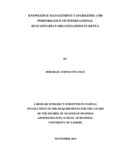| dc.description.abstract | In the present dynamic business environment, Knowledge has taken centre stage as a
valuable resource for firms, the most unique feature being that this knowledge is
embedded in the minds of the workers within the firms. More so, the management of
knowledge is considered important in the formation and transfer of organization’s
intellectual assets. Due to the rapid development of information technology, the
increased search for knowledgeable human resource, and the monotony that exists in
humanitarian organizations in Kenya, this study sought to address the following
question: What is the influence of KM capabilities on performance of international
humanitarian organizations in Kenya? The population of this study comprised of all
the 62 international humanitarian organizations operating in Kenya as identified by
the Relief web in 2016. Primary data was sought from management using a selfadministered
semi structured questionnaire. The quantitative data compiled was
analysed using descriptive statistics, using SPSS version 21 and Microsoft excel. The
study also used multiple regressions analysis to analyse the data, in order to measure
the relationship between the four KM capabilities and the performance of
international humanitarian organizations in Kenya. The findings of the study noted
that respondents were in agreement that their organizations base their performance on
knowledge creation. The research further shows that most respondents agreed that
their firm’s continuous learning, training and development is most valued and
encouraged. The study then concludes that KM capabilities affect the performance of
international humanitarian organizations in Kenya. These KM capabilities include
technological advancement, organization structure, organization culture and human
resource. Based on the outcome and conclusions, the study recommends that
managers of international humanitarian organizations should adopt technology that
influences them to identify the locations of specific kinds of knowledge within their
firms . The technology used in the organization should facilitate employees from
different geographical locations to learn and train as a group from multiple sources
and at different points in time. This will be supported by the relevant organization
structure, the culture that exists within the organization and most importantly, the
workers. This research further recommends that continuous learning, training and
development within the firm has to be valued and encouraged, giving emphasis to
knowledge creation, and as a result, firms can achieve their objectives. | en_US |



